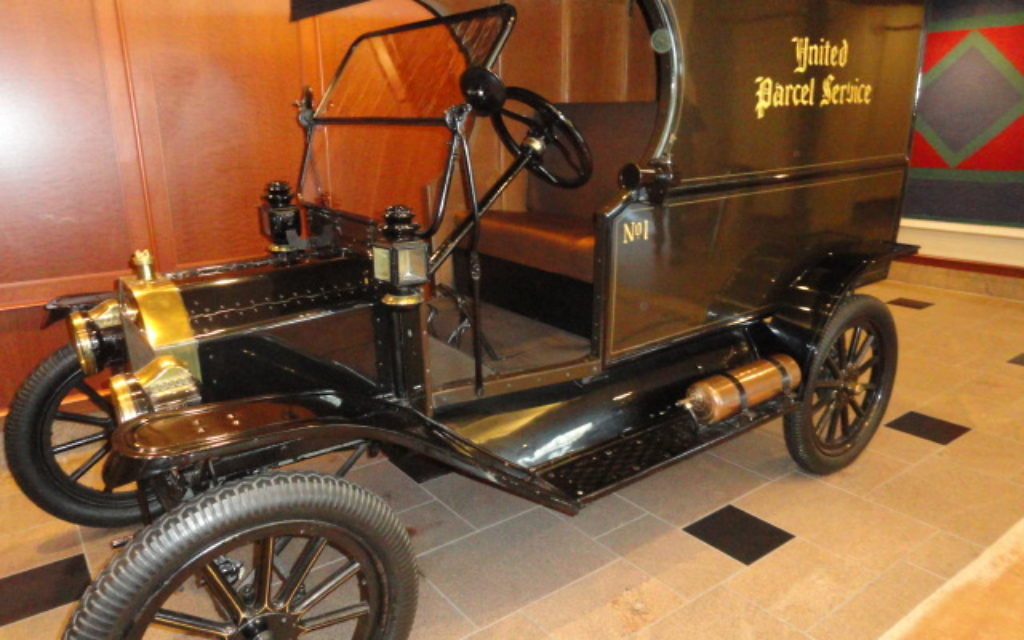Israeli Innovations Help UPS Save Tens of Millions
A mile here and a minute there can save UPS millions of dollars a year through the application of innovative technology to transportation.

Chuck Holland, the vice president of industrial engineering for UPS, explained the company’s technological accomplishments, often using Israeli-developed innovations, during the keynote address of the latest Israel, Innovation, Impact seminar on intelligent transportation Tuesday, Jan. 19.
The Conexx: America Israel Business Connector session took place at the Sandy Springs headquarters of UPS.
Get The AJT Newsletter by email and never miss our top stories Free Sign Up
“We’ve been around for 100 years. We have just over 400,000 employees. We operate in over 200 countries and territories with vehicles and aircraft,” Holland said. “We deliver 15 million packages a day and pick up from 8 million customers a day. In addition, we have supply chain services and a freight division.”
Saving money while operating such a behemoth is crucial to the success of UPS, Holland said. “If we can save one mile every single day on every one of our 55,000-plus drivers – and that’s just in the U.S. – that’s worth $50 million a year to us. If we’re able to shave a minute off those drivers, that’s worth $15 million a year.”
Holland pointed to a handheld device used by delivery personnel called the DIAD (delivery information acquisition device) as a key component in its system. “It’s really an assistant to our driver. We started developing the DIAD in the late 1980s and deployed it in 1990. We’ve had access to data from this for 25 years. The first generation was built in Israel for us by Motorola, and (eventually) we were able to buy it off the shelf with only minor modifications.”
When it came to the fourth generation of DIAD, Holland recalled that adding a GPS chip to the device was not necessarily a foregone conclusion. “It’s rather obvious today, but when we were designing that in the early 2000s, it was quite a decision to make, a multimillion-dollar one, on whether we were going to introduce that chip or not. We weren’t sure what we were going to leverage that chip for.”
They are pretty sure now. “Every time a driver completes an activity in the DIAD at a business or residence, when they hit ‘stop complete,’ we capture what the GPS coordinates are,” Holland said. “As a result, we have an address associated with a place on earth, with its coordinates, for over 250 million points around the globe.”
In the late 2000s the company launched Telematics, a set of applications analyzing information from each vehicle and integrating reports from the GPS with delivery and driver data. Sensors on the trucks can reveal engine performance and whether the truck goes into reverse, any doors are open or the seat belt is fastened.
“We can literally simulate what the driver did all day long,” Holland said. “It assists us with our work measurement as well. We’ve reduced excessive idling by 15 minutes by way of Telematics — one minute per driver is worth in excess of half a million dollars a year. We’ve reduced our backing (reversing) occurrences by 25 percent. It all improves their personal safety and serves our customers better.”
Holland ceded the floor to a Mobileye regional manager, Andy Holland (no relation), whose company develops driver warnings to prevent a crash. “We’re basically the early warning system so the driver can avoid and mitigate a situation,” he said, adding that 174 car models now on showroom floors carry the company’s technology and that Mobileye was the largest IPO ever to come out of Israel.
Representatives from Argus, an “automotive cybersecurity pioneer,” and Bazz, an Android application that reduces distractions from texting while driving, also spoke at the event.





comments